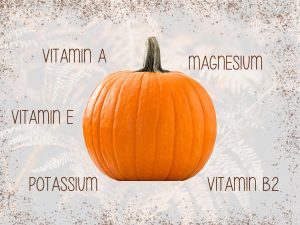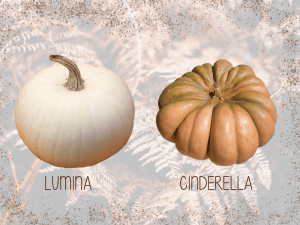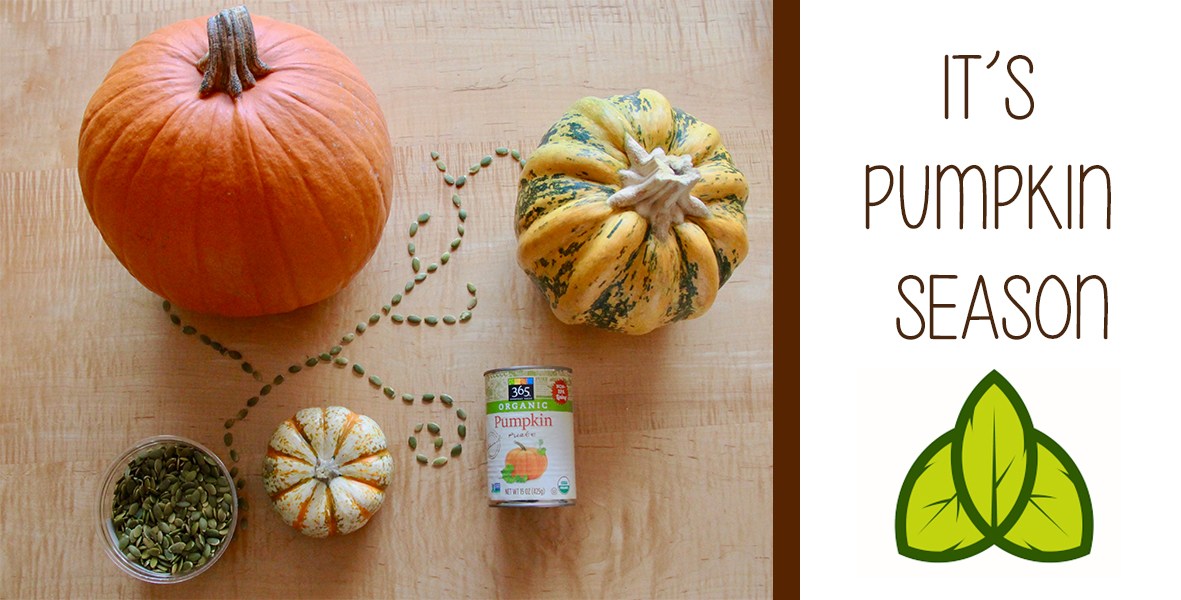|
The Health Benefits of Autumn's Most Popular Ingredients by 3natural Bionutrition It’s that time of year where pumpkin-flavored food and beverages are popping up everywhere. In 2015 American’s spent $500 million on pumpkin-flavored products, so I think it’s safe to say that pumpkin truly is the ingredient and flavor of the season. Pumpkin spice is likely the most common type of pumpkin flavoring you will see. Although pumpkin spice lattes and baked goods may be tasty, be aware that just because pumpkin is in the name, it doesn’t mean that it has the same health benefits as pumpkin. In fact, most pumpkin spice flavored foods and drinks don’t even contain real pumpkin. Instead, the pumpkin spice flavor often comes from flavor compounds that mimic the taste of pumpkin and spices. Pumpkins can be used for more than just jack-o’-lanterns, they are incredibly versatile and are a great ingredient. Whether it be the pumpkin ‘flesh’ (what you would use to make puree), or the pumpkin seeds, pumpkins are overall an incredibly nutrient-dense food that is an excellent source of fiber and micronutrients. What is the nutritional content of pumpkin and what are the health benefits of consuming it? Fiber Average American’s don’t consume enough fiber, with many only consuming 15 grams daily instead of the recommended 25-35 grams. Fiber is an essential part of your diet and is necessary to maintain bowel health, lower cholesterol levels and control blood sugar levels. If you’re not sure what your blood sugar level or cholesterol is, consider using the biometric analysis service we provide. Further information on this analysis can be found later in the article. Pumpkins provide both insoluble and soluble fiber, with pumpkin flesh providing mainly soluble fiber and pumpkin seeds providing mostly insoluble fiber. A cup of pureed pumpkin provides around 7g of fiber, whereas a cup of boiled unseasoned pumpkin provides about 2g of fiber. Pumpkin seeds are also a great source of fiber, with ¼ cup of pumpkin seeds contains almost 2g.  Vitamin A Eye health and the immune system both require Vitamin A. Pumpkins, like many other fruits and vegetables, contain the antioxidant beta-carotene which is converted to Vitamin A when ingested. Some scientific studies have shown that a healthy level of beta-carotene consumption may slow cognitive decline and reduce the risk of certain types of cancer. When it comes to maintaining eye health and preventing eye problems including cataracts and age-related macular degeneration, Vitamin A plays a significant role. Vitamin A also helps with preventing dry eye and is useful in helping with night vision and light sensitivity. Additionally, Vitamin A supports your immune system by assisting mucous membranes, such as in your nose, repel harmful viruses and bacteria. A cup of boiled pumpkin provided more than 200% of the recommended daily allowance of Vitamin A! Magnesium Pumpkin seeds are high in magnesium, protein, and are perfect for snacking. Half a cup of pumpkin seeds has around 20% of the recommended daily allowance of magnesium and 6g of protein. Magnesium is required for numerous bodily functions including metabolism and muscle movement. Due to their magnesium content, consuming pumpkin seeds may also lower your blood pressure and help you get a good night’s sleep. Most adults don’t consume the daily recommended amount of magnesium. Over time this can lead to problems such as the weakening of bones and muscles, high blood pressure, and anxiety. Blood tests are commonly used to test magnesium levels, and many adults are unaware that they have low magnesium levels. To find out if you have low magnesium levels and should be ingesting more magnesium, consider using Analytics. Potassium Potassium is crucial for the body to function properly, particularly for athletes. Consuming pumpkin after a long workout can replenish the potassium lost and restore the balance of fluid and electrolytes in the body. One cup of boiled pumpkin has 142mg more potassium than a banana! Vitamin E Vitamin E acts as an antioxidant that helps prevent damage to your cells and has the potential to lower your risk for cancer and heart disease; it is also essential for proper immune function. Some scientific studies have shown that Vitamin E may improve stamina and reduce your risk of cardiovascular disease. Pumpkin flesh and pumpkin seeds are a good source of Vitamin E. 1 cup of boiled pumpkin and ¼ a cup of pumpkin seeds both containing 10% of your daily recommended amount of Vitamin E. Vitamin B2 (Riboflavin) Vitamin B2, also known as riboflavin, has a vital role in metabolism since it assists in the conversion of carbohydrates into the body’s energy supply. Similarly to Vitamin A, Vitamin B2 is essential for maintaining eye health and mucous membranes, particularly in the gut. Vitamin B2 can also act as a powerful antioxidant and slow down the process of aging. There is 11% of your daily recommended amount of Vitamin B2 in 1 cup of boiled pumpkin, and 5% of your daily recommended amount in ¼ a cup of pumpkin seeds. Can pumpkins help with obesity? In a study published in the Journal of Complementary and Integrative Medicine, researchers found that pumpkins can keep the heart healthy even with obesity. In the study, researchers from Birjand University of Medical Sciences in Iran examined the anti-obesity effects of pumpkin in obese mice. Pumpkin is known to be rich in powerful antioxidants, and it contains lipid-lowering and anti-diabetes properties. For the study, the researchers randomly divided 30 adult mice into five groups: a healthy control group, an obese control group, and three experimental groups with obese mice that received pumpkin extract once a day at doses of 100 milligrams per kilogram (mg/kg), 200 mg/kg, and 400 mg/kg, respectively. Obesity was induced by feeding mice a high-fat diet. Meanwhile, the treatment with pumpkin extract went on for a period of six weeks. After the treatment period, the researchers measured the lipid profile, lipoprotein levels, liver enzymes, and oxidative stress status of the mice. Based on the results, the mice groups that received the pumpkin extract showed significant reductions in their triglycerides and low-density lipoprotein (LDL) or “bad” cholesterol. At the same time, the pumpkin extract greatly increased their high-density lipoprotein (HDL) or “good” cholesterol. In addition, the pumpkin extract increased glutathione level of the treatment groups compared to the obese control group. The effects of the pumpkin treatment were dose-dependent. Based on the findings of the study, the researchers concluded that pumpkin can reduce the risk of cardiovascular disease in obese individuals by reducing oxidative stress and improving cholesterol levels. More information on Analytics Here at 3natural Bionutrition we offer Analytics, which measures over 40 biomarkers in the blood. These markers include cortisol, folate, albumin, and many more. After measuring these markers an algorithm is used to assist us in revealing what solutions will optimize your performance, metabolism, sleep, energy and health. This algorithm is incredibly effective at providing personalized nutrition recommendations that will improve overall wellness, as shown in a recently released peer-reviewed paper. The paper, the first of its kind, highlights that “Algorithm-Based Personalized Nutrition Platform Improves Key Blood Biomarkers In Humans.” For more information on our Analytics services and how they can help you manage your own health, click here.  How to cook with pumpkins and use pumpkin seeds: What pumpkins should I use? When making pumpkin-flavored food at home, it is easiest to use pumpkin puree. Preparing pumpkin puree at home is best. Some types of pumpkin taste better than others, so if possible look for pumpkins that are commonly used for cooking. Try to find smaller pie pumpkins such as Cinderella pumpkins or Lumina pumpkins. These varieties are generally sweeter and will taste better than the conventional big pumpkins that are used for carving What are some things I can make with pumpkin and pumpkin seeds? Pumpkin puree can be used in a variety of dishes. If you enjoy Mexican cuisine try making pumpkin empanadas or pumpkin and black bean tacos. For those of you that enjoy Italian food, make a delicious pumpkin lasagna or a paleo cauliflower pumpkin risotto. Do you like to have a biscuit alongside your chili or soup? Here’s a quick pumpkin biscuit recipe. Pumpkin spice flavoring can be made at home and is a far healthier alternative to the processed pumpkin spice flavoring often used in drinks and food. All you need to do is mix together spices such as cinnamon, ginger, nutmeg and cloves, then voilà, you’ve got pumpkin spice flavoring you can add to anything you wish. You can also buy premade pumpkin pie spice mix which would have the right ratio of spices. Pumpkin seeds can be used in a variety of ways. You can roast them oil and a bit of Himalayan salt, and even make a pumpkin seed butter. Below is an easy to follow recipe for some delicious pumpkin seed butter that is great for those with nut allergies. This pumpkin seed butter can be spread on toast, added to yoghurt or smoothies, and can be used to dip vegetables into. The butter can also be added to the delicious meals provided through the fantastic organic meal delivery service we provide. These meals are expertly made and are perfect for students, military, busy parents, and business professionals. More information on the meal delivery services we offer: At 3natural Bionutrition we prioritize personalized nutrition, and offer organic meal delivery services from Trifecta and TrueFare. These services accommodate a range of dietary habits, eating restrictions and health-related goals. Both provide traditional meals but if you’re vegetarian, vegan, or just someone who wants to incorporate more whole foods and have a plant-based diet, then take a look at Trifecta. If you still want to focus on whole foods but desire to have meat in fish in your diet, then TrueFare may be a better match. TrueFare is Whole30® approved and also offers meals suitable for those who follow the AIP, Keto or Paleo diet. Both of these services offer nutritious ready to eat meals, making them a perfect option for people who want to prioritize their health but are also on the go. Pumpkin Seed Butter Ingredients 1 cup of raw pumpkin seeds 3 tsp coconut oil Optional Depending on if you want the butter to be sweet or salty Sweeter pumpkin seed butter ¼ tsp cinnamon + 2 tsp of maple syrup Savory pumpkin seed butter 2 pinches of Himalayan salt Directions Pour raw pumpkin seeds into a food processor and blend till they are finely chopped Add your coconut oil and other flavorings if desired, and continue to blend Blend until a creamy consistency, put in a jar, and enjoy! Comments are closed.
|
Categories
All
Archives
December 2023
|
|
|
|
|


 RSS Feed
RSS Feed
